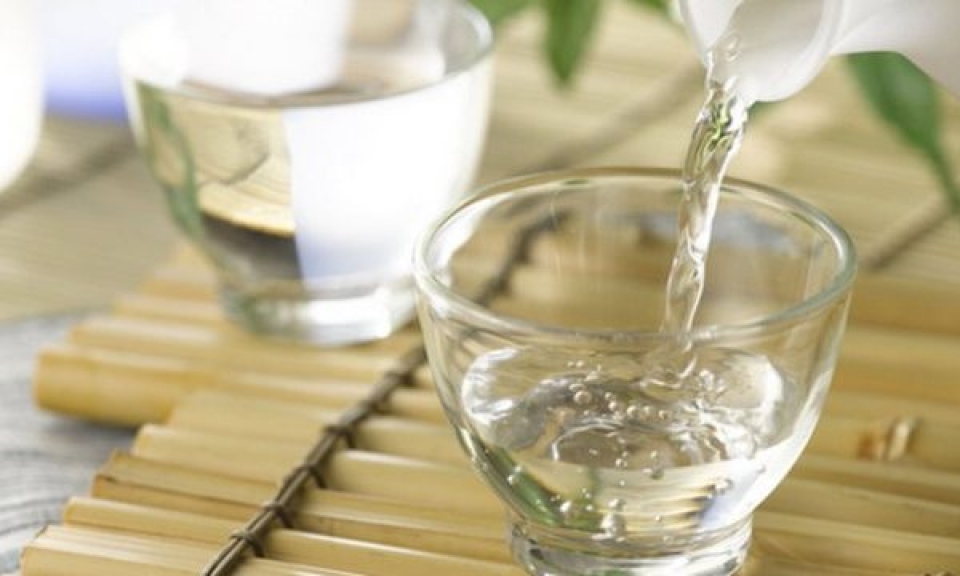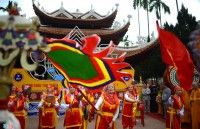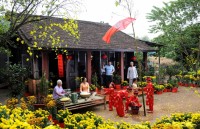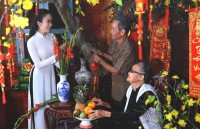
A toast to Vietnamese rice wine
Latest
| TIN LIÊN QUAN | |
| My village | |
| A contribution to human happiness: Pho | |
Vietnamese rượu (liquor) is generally distilled from rice, preferably sticky rice. The rice is steam cooked and, after cooling, is sprayed with yeast before being distilled. A kilo of rice can yield about a litre of rice wine. The strongest alcohol (40%) is called rượu tăm (frothy alcohol) because of the froth which appears on the surface when it is poured in a glass.
 |
| Vietnamese rượu (liquor). (Photo: Internet) |
Rice wine which has been soaked in traditional herbs is often referred to as medicinal wine, and is often kept in the home as a tonic. Many families use strong rice wine to preserve snakes, geckos and other reptiles. Such a concoction is believed to be an excellent cure for rheumatism and arthiritis. Mixing it with fruit juices such as apricot or plum also gives it a refreshing liqueur taste.
Whereas in the West, the world “alcohol” is ingeneral a pejorative connotation to a social life, evoking drunkenness, moral decadence, and an endless round of pubs and parties, in Vietnam it (rượu) has a much less social implication.
In fact, rice wine is justly counted among the noble pleasures of the scholars, placed on the smae footing as chess, poetry and music. It is even considered the elixir that the immoratal supernatural beings descending from heaven to sample. Rice wine is a cultural offering which people respectfully place on the altar to their ancestors or genies to mark important occasions. It is linked to literature, as many travelling poets carried flasks with them in a small cloth sack containing their poems. One popular game consisted of drinking together while improvising a poem, each contributing a verse alternately.
Rice wine is also an emblem of friendship. When you have good rượu it is frowned upon to drink alone. Instead you must share it with your friends. This more or less Dyonisiac tradiotion has been maintained throughout the centuries. Among the best known modern adepts are the poet Tản Đà (1888 - 1939) and, the prose writer Nguyễn Tuân (1910 - 1987) who are both also renowned as culinary connoisseurs.
In colonial times, aesthetes refused to drink “industrial” rice wine (rượu ty) of which the distillery Fontaine held the monopoly. They preferred the wine illegally made at home, which was known as rượu ngang.
In the 60s and 70s, a friend of mine who live on the other bank of the Red River still made a good living selling rice wine to the small inns in Ha Noi. In the 80s his business went form bad to worse, with wine losing ground with the onslaught of beer. Today, we witness the trumph of beer, with draught beer bars sprouting like mushrooms at every street corner.
While rice wine remains a cultural offering - the delicate beverage of old scholars which accompanies special dishes - beer has made its insolent appearance in all feasts, even in ordinary meals. Why this change of gastronomic style? No doubt because of the adoption of the lifestyle of the South following the reunification of the country in 1975, of rising living standards, the modern habit of eating out, especially during the mid-day break, the need for leisure time, and the pull of cheap, iced beer over traditional rice wine.
Curiously enough, one can obsere that in Europe, the countries which produce wine, such as France, Italy and Spain today consume less wine and drink more beer, whist the beer producing countries like Holland, Germany and Denmark are turning away from beer in favour of wine. In China and Japan, traditional drinkers of rice wine and sake are starting to discover grape wine and beer.
 | The month of festivities An old Vietnamese folk song reads: "The first month is given to Tết at home, the second to gambling, the third to festivities, etc." (The ... |
 | Tet and the Vietnamese cultural identity "I have never seen in the world a festival as popular as the Vietnamese Tet and with a more humanistic character," writes culturologist Huu Ngoc. |
 | Here comes Tết, the Lunar New Year In few weeks' time, Tết will usher in the Year of the Dog. To regard Tết simply as New Year's Day, as one would in ... |

















